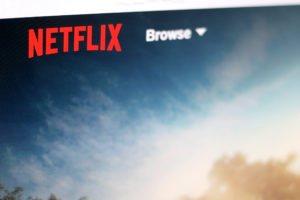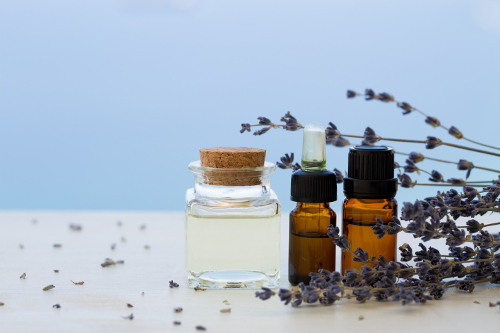The show explores the good and the bad, the helpful and the detrimental, all without explicit judgment. I understand the principle – let people talk, and let the viewer decide – but I came away feeling that there could have been more depth. Are essential oils safe or unsafe? Do they possess any proven useful properties? Such questions are barely explored, and no medical doctors make the final cut (I did recommend two, and I know the producer was excited to talk to one of them.)
 The upside – a third (non-medical) doctor, one of our tutors, is featured! Joy Bowles adds a sane, cautious note, initially just as voice-over, which is quite fun when you know that voice well. Lora Cantele, publisher of IJPHA and long-time friend is also featured, in her role of aromatherapist helping a special-needs family with essential oil blends. Right at the beginning, we see holistic nurse and clinical aromatherapist Amy Quarberg offering personal inhalers to a man experiencing post-surgical pain in a hospital in, Maplewood, Minnesota. In both cases, the recipient is given a choice of blends, and aromatherapy seems to be helpful.
The upside – a third (non-medical) doctor, one of our tutors, is featured! Joy Bowles adds a sane, cautious note, initially just as voice-over, which is quite fun when you know that voice well. Lora Cantele, publisher of IJPHA and long-time friend is also featured, in her role of aromatherapist helping a special-needs family with essential oil blends. Right at the beginning, we see holistic nurse and clinical aromatherapist Amy Quarberg offering personal inhalers to a man experiencing post-surgical pain in a hospital in, Maplewood, Minnesota. In both cases, the recipient is given a choice of blends, and aromatherapy seems to be helpful.
The show also takes a thorough look at the multi-level marketing side of the industry, and how it operates. We see how easily misinformation can spread – apparently, Frankincense oil helps clear the blood from around cells (perhaps confusion with a myth we address here) – and Netflix suggests that profit is the main driver, to the detriment of many who join. This has always been a point of contention in multi-level marketing. The cult-like aspects of MLM are featured, and the disconnect between someone showing friends how to drip essential oils directly into their mouth (voice-over about essential oils and cancer), and the challenges of safety – not to mention efficacy – is implied. Following an examination of the eccentric and controversial life and ethics of Gary Young (who founded Young Living) we see Stacy Haluka, who went public some years ago with her very nasty skin reaction to of essential oils, apparently from over-use. You can see Stacy’s account here. (All our adverse reaction reports are anonymous. If you want to report an adverse reaction, go here: https://tisserandinstitute.org/safety/adverse-reaction-database/#home/add-adverse-reaction-report/)
Essential Oils probably won’t change many minds. If you believe that essential oils are purely quack medicine with no real benefits but some dangers, then Netflix delivers. If you believe that aromatherapy can help people with behavioral issues or pain, Netflix delivers. I know many others were approached and interviewed for the project as well as myself, and while I understand not all material can make the final cut of a 50 minute episode, I would like to have seen a greater depth of opinions and practice. I have high hopes for Uncommon Scents, a documentary on aromatherapy that has been in the making for a while, and will encompass a broad range of voices.



I watched the episode and felt just about exactly the way Robert did! Overall pretty well balanced but the depth was limited by the short time and the range of topics they tried to cover. I watched the rest of the series and felt the same way about all of them: a balanced view, but not enough time to go in depth. I’d say they’re a great springboard to doing more research and discovery on your own, if any of the topics are of interest.
THANKS ROBERT- AGREED. The good news is people get to take another look at how they are using their YL and DoTerra oils. I felt the “TEACHING” COUPLE PROFILE ADDED NOTHING TO THE SHOW SINCE THEY SEEMED SO INGENUINE. IT WAS UPSETTING TO SEE PARENTS SPRAYING THEIR KIDS IN FACE – I HOPE PEOPLE DON’T TRY THIS AT HOME. Looking forward to the new film with high hopes!
I have just finished watching the Aromatherapy episode and concur with Robert’s opinion, however I would add that for those who are on the fence regarding aromatherapy I wonder whether this will tilt them towards a more negative opinion…
Yes, I think they could’ve done away with the multi level marketing part and focused more on safety and efficacy.
Exactly as Robert said. I watched the whole 6 episodes and felt that they could have gone deeper. I really can’t wait for uncommon Scents to be ready as it has been a long while.
I appreciate Robert’s blog, and I did watch the episode. I felt it captured enough for the novice to begin to formulate an opinion. I think those who are experienced will see good information, but will want more from the experts. Overall, i am ok with it… thank you for this blog!
I watched the documentary yesterday and feel it was a missed opportunity on the part of the producers. It was titled ‘essential oils’ but it focused too much on Young Living and Marketing! We needed more depth regarding the history of essential oils and everyday use. Was disappointed that we did not see/HEAR FROM robert Tisserand – the voice of reason/ethics and vast knowledge in this fascinating world of aromatherapy.
I Haven’t yet watched it, but I have had a “conversation” with a stranger on a health focused facebook group (buteyko method) and he had a really bad experience with mlm advice for essential oil use. sadly he has now formed the opinion that all essential oil use is dangerous.
I appreciate your commentary and like you, felt it showed value and positive focus on aromatherapy in a way that is not often seen to the public eye. More depth was needed but it did show that it can be beneficial on various levels.
Vi el documental apenas ayer y creo que se dedicaron más que nada al tema de young iving y su compañia multinivel y de alguna manera aprovechar para poner en tela de juicio el uso de los aceites esenciales por las reacciones adversas que algunos han tenido. Pero no se detienen en los beneficios. Aparte de la enfermera del comienzo y la que trata a la niña con autismo, han podido entrevistar a algun cientifico calificado en el tema. Es muy superficial todo.
I’m always eager to see holistic health practices get coverage. i agree largely with what you’ve written here and appreciated their storytelling around folks who’ve used essential oils in the healthcare system and in families with special needs. Where it went wrong, in my opinion, was the inclusion of the MLM (although I understand why it was included.) Holistic, alternative and integrative medicine needs people advocating for it who understand it and can use/talk about it responsibly. My biggest issue was the focus on one of the MLM profiles of a young woman making outrageous claims about essential oils—that EOs can treat and cure cancer, diabetes, etc. No doubt essential oils, like all medicinal plants, have properties that support the human body—but if someone is promoting something that they don’t understand, nor want to understand outside of their own anecdotal experience (in the example from the episode of the woman using EOs for curing cancer,) I feel that it a dangerous place to be and can also delegitimize the efforts of organizations like the Tisserand Institute as well as herbalists, aromatherapists, etc.